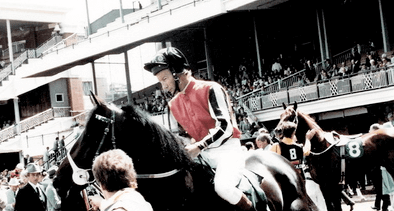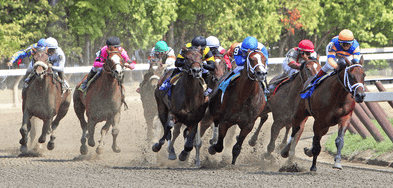
Horse racing is a type of equestrian performance sport which involves jockeys riding their horses over a specified distance in order to determine a winner. Horse racing is a particularly ancient sport and its main premise i.e. that of identifying which horse can run the fastest over a particular distance or course, has not changed since its earliest days. The format of horse races can vary widely. Some countries have created horse racing traditions of their own and variations may include racing only certain breeds, tracks which include obstacles, varying distances, a range of track surfaces, or even running with different gaits.
Betting in Horse Racing

Although horses are occasionally raced entirely for fun, a large part of the interest taken in horse racing and, indeed, its economic importance, is from the gambling which is linked with it – an activity which generates billions of dollars. There are betting stations at most horse races where gamblers are able to place bets on their chosen horse. There are some tracks where gambling is banned, including Springdale Race Course which is home to the Toronto-Dominion Bank Carolina Cup and the Colonial Cup Steeplechase.
At tracks where gambling is permitted, parimutuel betting is sometimes offered. This is a system in which gamblers' money is collected and pooled together and then shared amongst the winners once the results of the race have been declared. Some countries have a different system. For example, in Ireland, Australia and the UK, bookmakers offer a popular alternative facility. They make a market in odds which enables the gambler to lock in the odds on their chosen horse at a given time.
There are two main ways of betting on horse racing – betting to win or to place. A straight bet, or a bet to win, is when the gambler stakes a sum of money on their chosen horse in the hope that it comes in first. In a place bet, the gambler is betting that their horse will either come first, second or third depending on the number of horses running. There is also such a thing as an Each Way bet in many countries, although the definition may vary. This type of bet sees the amount of the bet split in half, with half on the place and half on the win. The gambler will receive a payout if their chosen horse either wins or is placed second or third.
Gamblers may also choose an exotic wager which is the chance to incorporate the placement of several horses across one or more races. There are both horizontal and vertical exotic wagers with the former being bets on several horses in a single race and the latter being a prediction of results across several races. The names of some of these exotic wagers include exactas, trifectas, superfectas, quinellas and daily doubles.
As well as being able to place bets with a bookmaker, it is also possible for punters to bet through online betting exchanges. These allow punters to act as their own bookmaker with the horse's odds being set by the exchange's market conditions dictated by the members' own activity. Alternatively if you do not horse or sports betting, you can always switch to casino gamblig. If you do not know where to find the latest online casino welcome offers, simply check the link!
Criticism of Horse Racing
Several organised groups which are dedicated to the protection of animals believe that horse racing is cruel due to the potential dangers to the horses and the level of stress that they are put under during racing. Criticism of horse racing can take many forms, with some people considering the use of whips or poor living conditions to be abusive to the animals. One example of horse racing criticism comes from People for the Ethical Treatment of Animals (PETA), the American animal rights group, which released a video in 2009 of alleged abuse of retired race horses in Japan in which it was stated that up to 20,000 horses had been killed for use as pet and human food. This led to a call for a ban on the exportation of race horses to Japan.
The Dangers of Horse Racing
Both jockeys and horses face dangers when participating in horse racing. Horses can fall and stumble, either when on the track or when jumping over an obstacle, and this puts both the rider and the animal itself at risk of being trampled and injured. Official figures show that more than 600 out of 1000 jockeys will require medical treatment for an injury in just one year, with a fifth of those treatments being for serious injuries to the neck or head. Over a three year period between 1993 and 1996 there were 6545 injuries reported from horse racing and over 100 jockeys died during racing between 1950 and 1987. Reports also show that around 1.5 horses die from every 1000 starts in the United States. In 2006 alone, it is estimated that around 600 horses died on American race tracks, however this may also be due to drugs which are permitted to be given to race horses in the United States which have been banned from use in other countries in the world.






